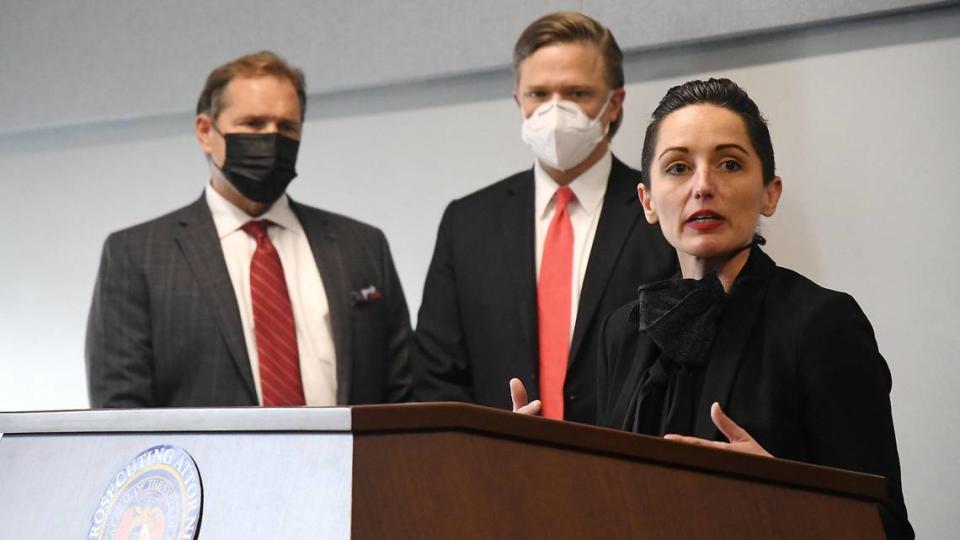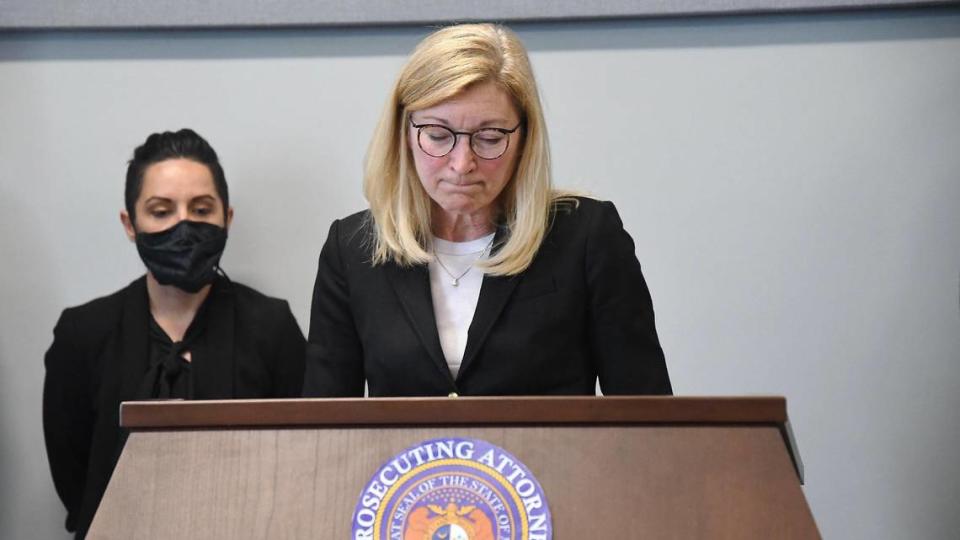Kevin Strickland is innocent, officials say. Can that free him from Missouri prison?
If Kevin Strickland had been convicted in Kansas, he might be free by now.
But not in Missouri, where Strickland, 61, remains imprisoned for a 1978 triple murder even though Kansas City’s top prosecutors and Jackson County’s presiding judge say he is innocent and must be freed immediately.
Strickland, who has spent more than 40 years in prison, has maintained his innocence and this week received a rare wave of support led by the Jackson County Prosecutor’s Office, which convicted him decades ago.
While that support is widely considered by Strickland’s advocates to be a help, there is no guarantee that he will be released from prison anytime soon. Obtaining an exoneration is a difficult path obstructed by legal hurdles that may take months or years to overcome, according to legal experts.
In Kansas, Strickland would have been able to file a petition for his freedom before a judge in the trial court, which would set a hearing. Through that process, he might have already been released.
Instead, Strickland joins at least two other men who prosecutors or judges have recently agreed are innocent yet remain behind bars in Missouri. One of those men, Lamar Johnson, received a public push similar to Strickland’s nearly two years ago in St. Louis.
“Our criminal justice system places a very high value on finality,” said Rodney Uphoff, a law professor with the University of Missouri. “And that makes it extremely difficult to overturn results in many cases.”
This week, Strickland’s attorneys filed a petition in the Missouri Supreme Court urging his release. A few days later, a bill was sent by lawmakers to Gov. Mike Parson’s desk that would allow prosecutors to ask a judge to free Strickland.
Tricia Rojo Bushnell, one of Strickland’s lawyers and director of the Midwest Innocence Project, said Strickland’s case brings home two issues in Missouri: is innocence enough of a claim to free prisoners not sentenced to die? And what power do prosecutors have when they find an injustice?
“In Missouri, those are two things that have been at issue and at odds, or at least there’s been no clear answer,” Rojo Bushnell said.
“And so, where does that leave Kevin?”
Strickland’s appeals denied
Strickland’s first trial in 1979 ended with a hung jury of 11 to one, with the only Black juror holding out for acquittal.
At his second trial, Strickland, 19, was found guilty of capital murder based almost entirely on the testimony of a traumatized woman who had been shot during the murders. He was convicted by an all-white jury, which his lawyers argue was intentional.
Prosecutors waived the death penalty, and Strickland was sentenced to life in prison without the possibility of parole for 50 years.
Since then, two men who pleaded guilty in the murders swore Strickland was not with them and two other accomplices during the April 25, 1978, killings at 6934 S. Benton Ave. The lone eyewitness also recanted her testimony.
Over the years, Strickland filed appeals on his own saying he was innocent. He was denied each time.
On Monday, Strickland’s attorneys filed a petition in the Missouri Supreme Court urging his immediate release. Prosecutors agreed Strickland is innocent following a months-long case review after they read The Star’s investigation of the case.
At a news conference Monday, reporters asked: Why did it take so long to determine Strickland is innocent? And why hasn’t he been released?

One of Strickland’s attorneys, Robert Hoffman, said when the criminal justice system does wrong, there are “really hard to explain, enormous hurdles” to correcting it.
“It’s not correct yet; we’re not done,” Hoffman said. “Our fight has only just begun.”
The Missouri Supreme Court could let Strickland out tomorrow if the justices thought that was appropriate, legal experts said. But it usually orders the Missouri Attorney General’s Office to respond before arguments are made and a decision comes down.
The attorney general’s office intends to respond to Strickland’s petition in court and declined to comment before that action, a spokesman said.
That office has opposed just about every wrongful conviction case to come before it since 2000, according to Chicago-based news outlet Injustice Watch.
It’s unclear how much more time Strickland could lose in prison, Rojo Bushnell said.
“Everyone is paying attention to him right now, but maybe in weeks or a year — we don’t know — he could still be sitting there, even though everyone says he’s innocent,” she said.
‘Is innocence enough?’
As Strickland was coming up on his 25th year in prison, the Missouri Supreme Court heard oral arguments in the case of Joseph Amrine, who was wrongly convicted in the killing of a fellow prisoner in Jefferson City.
In one exchange during the 2003 arguments, a justice asked a question of Assistant Attorney General Frank Jung.
“Are you suggesting … even if we find that Mr. Amrine is actually innocent, he should be executed?” Justice Laura Denvir Stith asked.
Jung responded: “That’s correct, your honor.”
Amrine, who spent 17 years on death row, was instead exonerated and released. The court found him innocent.
After that decision, it was thought innocence was enough to free a prisoner in Missouri.
That was until 2016, when freedom was denied to a man named Rodney Lincoln, who swore he was wrongly convicted in the 1982 killing of a St. Louis woman.
The Missouri Court of Appeals in the Western District determined that prisoners could not make “freestanding” claims of innocence unless they had been sentenced to death, as Amrine had been, legal experts said.
“We thought that we opened an avenue for innocent prisoners,” said Sean O’Brien, a University of Missouri-Kansas City law professor who represented Amrine. “And then comes Rodney Lincoln.”
The state’s supreme court declined to hear Lincoln’s appeal, but his sentences were commuted by then-Gov. Eric Greitens. He spent 36 years in prison.
In Strickland’s case, instead of going to a lower court, his attorneys filed his petition with the state’s highest court, which could resolve the question of whether inmates not sentenced to death can be freed if they prove their innocence.
“Do you have to be sentenced to death in order to have innocence be enough?” Rojo Bushnell asked at Monday’s news conference. “Or is innocence enough for everyone?”
In support of Strickland’s petition, the Jackson County Prosecutor’s Office noted in a court filing that in Amrine’s case, the justices surmised it is “difficult to imagine a more manifestly unjust and unconstitutional result than permitting the execution of an innocent person.”
But when faced with Strickland’s case, prosecutors wrote, it is “not difficult to imagine another manifestly unjust and unconstitutional result: the continued confinement for 50 years of an innocent person.”
While inmates can make claims of constitutional violations, lower courts have been split on whether innocence alone is a reason for freedom.
In 2019, Ricky Kidd was exonerated after he spent 23 years in prison for a 1996 double murder in Kansas City that he did not commit. A DeKalb County judge ordered Kidd’s release after he determined Kidd’s innocence was “clear and convincing.”
Last year, however, a Texas County judge determined innocence is not enough to free prisoners not sentenced to death because of the high court’s previous ruling. That decision came in the case of Christopher Dunn, who has been incarcerated since 1990 for a St. Louis murder — even though the judge agreed new evidence would make it unlikely a jury would convict him.
“I feel like Dred Scott,” Dunn, 49, told a columnist at the St. Louis Post-Dispatch, referring to the slave who unsuccessfully sued for his freedom in the 1850s.
Kent Gipson, Dunn’s Kansas City-based attorney, said Dunn was robbed of the prime of his life — much like Strickland.
“It doesn’t make any sense that somebody serving death by incarceration should be treated any differently than somebody on death row,” Gipson said.
“The justice system shouldn’t be that way in a free country,” he added.
Power of prosecutors
In 2019, St. Louis Circuit Attorney Kim Gardner filed a motion with the Missouri Supreme Court seeking a new trial for Lamar Johnson, 47, who she said has been wrongly imprisoned for the past 26 years for a 1994 murder.
The court denied that request in March, saying the case was not about whether Johnson was innocent.
The motion was dismissed on the grounds that local prosecutors such as Gardner lack the ability to seek a new trial decades after a verdict has been rendered.
As a result, Jackson County’s prosecutor was left “literally and legally” powerless to free Strickland, said O’Brien, the UMKC professor, who has helped free innocent people in Missouri.
“Lamar Johnson strips Jean Peters Baker of any jurisdiction to act,” O’Brien said. “She is no different than you or me standing up and saying, ‘This man is innocent; he should be let go,’ in terms of the obligation of a court to listen.”
As more innocence cases have come to light in recent years, teams of prosecutors tasked with reviewing convictions — commonly called Conviction Integrity Units — have become more common.
Strickland is the first person deemed innocent by Baker’s unit.

Prosecutors and politicians have called for innocent prisoners to be freed before, but the unity among leaders calling for Strickland’s exoneration is rare, O’Brien said. One aspect of it is unprecedented, he said.
“It’s the first time it’s happened and every one of these people is powerless to accomplish justice,” O’Brien said. “In the past when it’s happened, the guy goes free like, the next day.”
Not long ago, it was highly unusual to have prosecutors help out with innocence claims — and in many cases, prosecutors were actively fighting to uphold convictions, said Uphoff, the University of Missouri professor.
There is a growing recognition, Uphoff said, that the system is “not as infallible as we once thought it was.”
With cases like Strickland’s before the Missouri Supreme Court, the opportunity exists to give more leeway to local jurisdictions, Uphoff said.
“We ought to be able to correct those mistakes and do it in a more speedy fashion than has been done in the Strickland case,” he added.
The bill sent to Parson’s desk this week offers the opportunity for those changes to be made legislatively. If signed, it would clear the way for innocence claims to be brought before trial courts whenever a prosecutor believes an incarcerated person is innocent.
The state attorney general’s office would continue to have the authority to make arguments in court.
Baker, Jackson County’s prosecutor, celebrated the General Assembly’s action.
“My hope is that Mr. Strickland will not need this new fix because his case is before the Supreme Court now,” Baker said in a statement Thursday.
“But I will use any pathway available to exonerate and free him.”

 Yahoo Finance
Yahoo Finance 